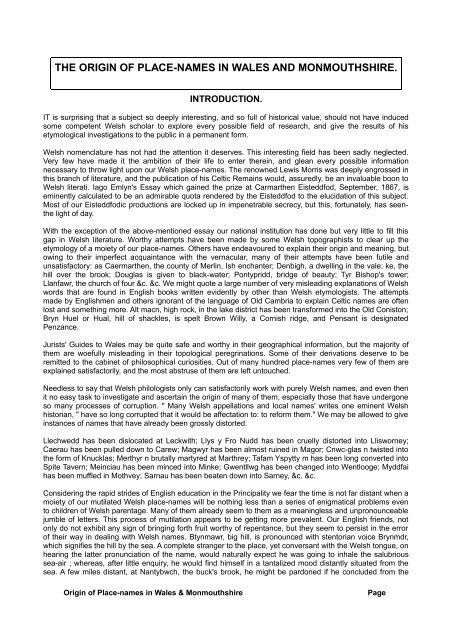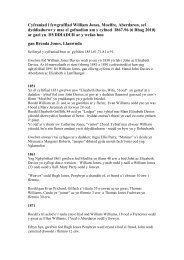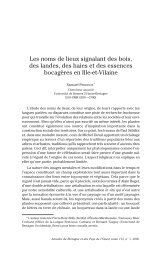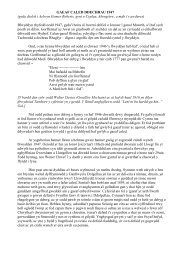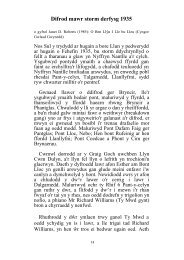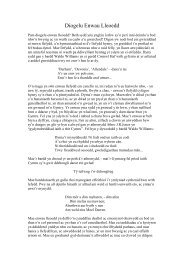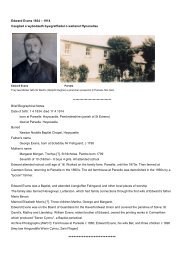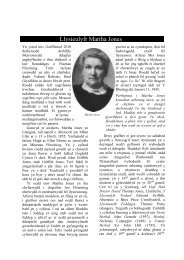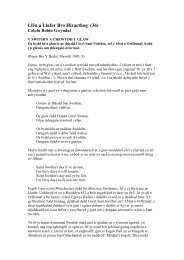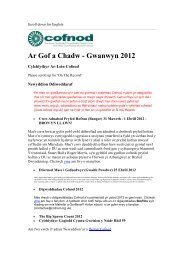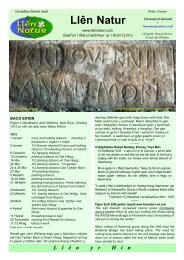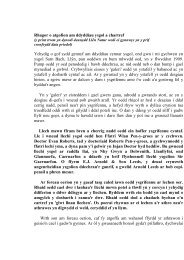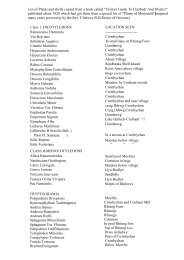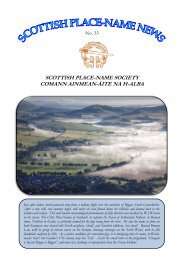THE ORIGIN OF PLACE-NAMES IN WALES AND MONMOUTHSHIRE.INTRODUCTION.IT is surpris<strong>in</strong>g that a subject so deeply <strong>in</strong>terest<strong>in</strong>g, <strong>and</strong> so full <strong>of</strong> historical value, should not have <strong>in</strong>ducedsome competent Welsh scholar to explore every possible field <strong>of</strong> research, <strong>and</strong> give <strong>the</strong> results <strong>of</strong> hisetymological <strong>in</strong>vestigations to <strong>the</strong> public <strong>in</strong> a permanent form.Welsh nomenclature has not had <strong>the</strong> attention it deserves. This <strong>in</strong>terest<strong>in</strong>g field has been sadly neglected.Very few have made it <strong>the</strong> ambition <strong>of</strong> <strong>the</strong>ir life to enter <strong>the</strong>re<strong>in</strong>, <strong>and</strong> glean every possible <strong>in</strong>formationnecessary to throw light upon our Welsh <strong>place</strong>-<strong>names</strong>. The renowned Lewis Morris was deeply engrossed <strong>in</strong>this branch <strong>of</strong> literature, <strong>and</strong> <strong>the</strong> publication <strong>of</strong> his Celtic Rema<strong>in</strong>s would, assuredly, be an <strong>in</strong>valuable boon toWelsh literati. Iago Emlyn's Essay which ga<strong>in</strong>ed <strong>the</strong> prize at Carmar<strong>the</strong>n Eisteddfod, September, 1867, isem<strong>in</strong>ently calculated to be an admirable quota rendered by <strong>the</strong> Eisteddfod to <strong>the</strong> elucidation <strong>of</strong> this subject.Most <strong>of</strong> our Eisteddfodic productions are locked up <strong>in</strong> impenetrable secrecy, but this, fortunately, has seen<strong>the</strong>light <strong>of</strong> day.With <strong>the</strong> exception <strong>of</strong> <strong>the</strong> above-mentioned essay our national <strong>in</strong>stitution has done but very little to fill thisgap <strong>in</strong> Welsh literature. Worthy attempts have been made by some Welsh topographists to clear up <strong>the</strong>etymology <strong>of</strong> a moiety <strong>of</strong> our <strong>place</strong>-<strong>names</strong>. O<strong>the</strong>rs have endeavoured to expla<strong>in</strong> <strong>the</strong>ir <strong>orig<strong>in</strong></strong> <strong>and</strong> mean<strong>in</strong>g, butow<strong>in</strong>g to <strong>the</strong>ir imperfect acqua<strong>in</strong>tance with <strong>the</strong> vernacular, many <strong>of</strong> <strong>the</strong>ir attempts have been futile <strong>and</strong>unsatisfactory: as Caermar<strong>the</strong>n, <strong>the</strong> county <strong>of</strong> Merl<strong>in</strong>, Ish enchanter; Denbigh, a dwell<strong>in</strong>g <strong>in</strong> <strong>the</strong> vale; ke, <strong>the</strong>hill over <strong>the</strong> brook; Douglas is given to black-water; Pontypridd, bridge <strong>of</strong> beauty; Tyr Bishop's tower;Llanfawr, <strong>the</strong> church <strong>of</strong> four &c. &c. We might quote a large number <strong>of</strong> very mislead<strong>in</strong>g explanations <strong>of</strong> Welshwords that are found <strong>in</strong> English books written evidently by o<strong>the</strong>r than Welsh etymologists. The attemptsmade by Englishmen <strong>and</strong> o<strong>the</strong>rs ignorant <strong>of</strong> <strong>the</strong> language <strong>of</strong> Old Cambria to expla<strong>in</strong> Celtic <strong>names</strong> are <strong>of</strong>tenlost <strong>and</strong> someth<strong>in</strong>g more. Alt macn, high rock, <strong>in</strong> <strong>the</strong> lake district has been transformed <strong>in</strong>to <strong>the</strong> Old Coniston;Bryn Huel or Hual, hill <strong>of</strong> shackles, is spelt Brown Willy, a Cornish ridge, <strong>and</strong> Pensant is designatedPenzance.Jurists' Guides to Wales may be quite safe <strong>and</strong> worthy <strong>in</strong> <strong>the</strong>ir geographical <strong>in</strong>formation, but <strong>the</strong> majority <strong>of</strong><strong>the</strong>m are woefully mislead<strong>in</strong>g <strong>in</strong> <strong>the</strong>ir topological peregr<strong>in</strong>ations. Some <strong>of</strong> <strong>the</strong>ir derivations deserve to beremitted to <strong>the</strong> cab<strong>in</strong>et <strong>of</strong> philosophical curiosities. Out <strong>of</strong> many hundred <strong>place</strong>-<strong>names</strong> very few <strong>of</strong> <strong>the</strong>m areexpla<strong>in</strong>ed satisfactorily, <strong>and</strong> <strong>the</strong> most abstruse <strong>of</strong> <strong>the</strong>m are left untouched.Needless to say that Welsh philologists only can satisfactorily work with purely Welsh <strong>names</strong>, <strong>and</strong> even <strong>the</strong>nit no easy task to <strong>in</strong>vestigate <strong>and</strong> ascerta<strong>in</strong> <strong>the</strong> <strong>orig<strong>in</strong></strong> <strong>of</strong> many <strong>of</strong> <strong>the</strong>m, especially those that have undergoneso many processes <strong>of</strong> corruption. " Many Welsh appellations <strong>and</strong> local <strong>names</strong>' writes one em<strong>in</strong>ent Welshhistorian, " have so long corrupted that it would be affectation to: to reform <strong>the</strong>m." We may be allowed to give<strong>in</strong>stances <strong>of</strong> <strong>names</strong> that have already been grossly distorted.Llechwedd has been dislocated at Leckwith; Llys y Fro Nudd has been cruelly distorted <strong>in</strong>to Llisworney;Caerau has been pulled down to Carew; Magwyr has been almost ru<strong>in</strong>ed <strong>in</strong> Magor; Cnwc-glas n twisted <strong>in</strong>to<strong>the</strong> form <strong>of</strong> Knucklas; Merthyr n brutally martyred at Marthrey; Tafam Yspytty m has been long converted <strong>in</strong>toSpite Tavern; Me<strong>in</strong>ciau has been m<strong>in</strong>ced <strong>in</strong>to M<strong>in</strong>ke; Gwentllwg has been changed <strong>in</strong>to Wentlooge; Myddfaihas been muffled <strong>in</strong> Mothvey; Sarnau has been beaten down <strong>in</strong>to Sarney, &c. &c.Consider<strong>in</strong>g <strong>the</strong> rapid strides <strong>of</strong> English education <strong>in</strong> <strong>the</strong> Pr<strong>in</strong>cipality we fear <strong>the</strong> time is not far distant when amoiety <strong>of</strong> our mutilated Welsh <strong>place</strong>-<strong>names</strong> will be noth<strong>in</strong>g less than a series <strong>of</strong> enigmatical problems evento children <strong>of</strong> Welsh parentage. Many <strong>of</strong> <strong>the</strong>m already seem to <strong>the</strong>m as a mean<strong>in</strong>gless <strong>and</strong> unpronounceablejumble <strong>of</strong> letters. This process <strong>of</strong> mutilation appears to be gett<strong>in</strong>g more prevalent. Our English friends, notonly do not exhibit any sign <strong>of</strong> br<strong>in</strong>g<strong>in</strong>g forth fruit worthy <strong>of</strong> repentance, but <strong>the</strong>y seem to persist <strong>in</strong> <strong>the</strong> error<strong>of</strong> <strong>the</strong>ir way <strong>in</strong> deal<strong>in</strong>g with Welsh <strong>names</strong>. Btynmawr, big hill, is pronounced with stentorian voice Brynmdr,which signifies <strong>the</strong> hill by <strong>the</strong> sea. A complete stranger to <strong>the</strong> <strong>place</strong>, yet conversant with <strong>the</strong> Welsh tongue, onhear<strong>in</strong>g <strong>the</strong> latter pronunciation <strong>of</strong> <strong>the</strong> name, would naturally expect he was go<strong>in</strong>g to <strong>in</strong>hale <strong>the</strong> salubrioussea-air ; whereas, after little enquiry, he would f<strong>in</strong>d himself <strong>in</strong> a tantalized mood distantly situated from <strong>the</strong>sea. A few miles distant, at Nantybwch, <strong>the</strong> buck's brook, he might be pardoned if he concluded from <strong>the</strong>Orig<strong>in</strong> <strong>of</strong> Place-<strong>names</strong> <strong>in</strong> Wales & MonmouthshirePage
pitiful cries <strong>of</strong> <strong>the</strong> railway <strong>of</strong>ficials that <strong>the</strong>re were none-to-book at that station. If he pursued his journey toLlwydcoed, grey wood, which is pronounced by <strong>the</strong> railway men Lycod, he would naturally conclude that <strong>the</strong><strong>place</strong> must have been sometime noted for rats, because Llygod is <strong>the</strong> Welsh for rats.In go<strong>in</strong>g through Loughor, provided his geographical knowledge were deficient, he would imag<strong>in</strong>e himself tohave reached Llotgr, which is <strong>the</strong> Welsh name for Engl<strong>and</strong>. And a few miles lower down he would f<strong>in</strong>dhimself at Llanelly, which is pronounced by certa<strong>in</strong> parties Lan-hcalthy r , where he would be <strong>in</strong>duced to callhis <strong>in</strong>hal<strong>in</strong>g powers <strong>in</strong>to full play, positively th<strong>in</strong>k<strong>in</strong>g he was l<strong>and</strong>ed <strong>in</strong> a <strong>place</strong> famous for its salubriousness.In North Wales he would discover <strong>the</strong> same aptitude <strong>in</strong> <strong>the</strong> art <strong>of</strong> mispronunciation. Amid <strong>the</strong> d<strong>in</strong> <strong>of</strong> <strong>the</strong> " fieryhorse " he might hear a name pronounced Aber-jeel, <strong>the</strong> suffix <strong>of</strong> which would rem<strong>in</strong>d him at once <strong>of</strong> <strong>the</strong>H<strong>in</strong>dostanee for a morass, or a shallow lake ; but a few m<strong>in</strong>utes talk with a villager would soon relieve himfrom <strong>the</strong> nightmare <strong>of</strong> this confusion <strong>of</strong> tongues by furnish<strong>in</strong>g him with <strong>the</strong> right pronunciation, Aber-gele, anout-<strong>and</strong>-out Welsh name. At Dolgellau, which is pronounced Dol-jelly, he might almost imag<strong>in</strong>e <strong>the</strong> name toimply a doll made <strong>of</strong> jelly ; <strong>and</strong> at Llangollen, pronounced Lan-jolen, he would, both from a geographical <strong>and</strong>etymological po<strong>in</strong>t <strong>of</strong> view, <strong>in</strong>dulge himself <strong>in</strong> little self-congratulation on be<strong>in</strong>g conveyed to a jolly <strong>place</strong>.Now he has travelled far enough to be thoroughly conv<strong>in</strong>ced <strong>of</strong> <strong>the</strong> necessity <strong>of</strong> mak<strong>in</strong>g an effort to save ourlocal <strong>names</strong> from <strong>the</strong> relentless h<strong>and</strong>s <strong>of</strong> <strong>the</strong> foreigner before <strong>the</strong>y become so distorted as to be difficult <strong>of</strong>recognition even by Welsh etymologists.Pure Welsh <strong>names</strong> should be left <strong>in</strong>tact — those that have undergone any changes should, if possible, berestored to <strong>the</strong>ir primitive form, <strong>and</strong> English equivalents or <strong>names</strong> should be given to each <strong>and</strong> every one <strong>of</strong><strong>the</strong>m.An attempt is be<strong>in</strong>g made <strong>in</strong> this book to assign English <strong>names</strong> to all <strong>the</strong> <strong>place</strong>s that bear Welsh or quasi-Welsh appellations. This was by no means an easy task.Fear <strong>and</strong> trembl<strong>in</strong>g haunted us all along <strong>the</strong> l<strong>in</strong>e, lest we should fail to give <strong>in</strong>telligible, short, <strong>and</strong> easilypronounced<strong>names</strong> <strong>in</strong> English garb. Perhaps we have sacrificed too much upon <strong>the</strong> altar <strong>of</strong> conciseness. Afull, literal translation <strong>of</strong> many <strong>of</strong> our <strong>place</strong>-<strong>names</strong>, designed for English Appellations, would be none lessthan an etymological onus to o<strong>the</strong>rs than Welshmen, so we were naturally led to <strong>the</strong> o<strong>the</strong>r extreme. In orderto avoid a repetition <strong>of</strong> a literary ordeal to our dim-Cymraeg friends, we felt " 'tis better to be brief thantedious." The entic<strong>in</strong>g name Llanfairpwllgwyngyllgogerychwyrndrobwllantysiliogogogoch has been reducedto Whitwood. It is said that a Welsh celebrity at a certa<strong>in</strong> railway station asked for a ticket to <strong>the</strong> last-named<strong>place</strong>, <strong>and</strong> <strong>the</strong> retort given, ex ca<strong>the</strong>dra, was that such a <strong>place</strong> was not <strong>in</strong> existence ; whereas, if he had onlyasked for a ticket to Llanfair P.G., <strong>the</strong> clipped form <strong>of</strong> <strong>the</strong> name, he would have been supplied with it<strong>in</strong>stantaneously. Llanfair-mathafam-eithiaf has been abbreviated to Meadton, &c. &c. These longitud<strong>in</strong>aldesignations should be preserved <strong>in</strong>tact, <strong>and</strong> transmitted to <strong>the</strong> Welsh cab<strong>in</strong>et <strong>of</strong> curiosities <strong>in</strong> nomenclature,<strong>and</strong> brief English <strong>names</strong>, such as Whitwood, Meadton, &c, should be adopted for <strong>the</strong> common purposes <strong>of</strong>everyday life.In pursu<strong>in</strong>g <strong>the</strong> study <strong>of</strong> Welsh <strong>place</strong>-<strong>names</strong> we were forcibly rem<strong>in</strong>ded <strong>of</strong> Home Tooke's observation, as to "letters, like soldiers, be<strong>in</strong>g very apt to desert <strong>and</strong> drop <strong>of</strong>f <strong>in</strong> a long march." Contraction <strong>in</strong>creases ourdifficulties <strong>in</strong> endeavour<strong>in</strong>g to get at <strong>the</strong> full <strong>and</strong> correct import <strong>of</strong> words. If <strong>the</strong> American tendency - topronounce words exactly as <strong>the</strong>y are spelt <strong>and</strong> written - were a universal pr<strong>in</strong>ciple, <strong>the</strong> burdens <strong>of</strong> philologistswould be considerably lessened. Such is not <strong>the</strong> case <strong>in</strong> Welsh nomenclature. Although every Welsh letter issupposed to have its own dist<strong>in</strong>ct sound, wherever <strong>place</strong>d, many <strong>of</strong> <strong>the</strong>m have dropped <strong>of</strong>f <strong>in</strong> long marches,<strong>and</strong> some <strong>in</strong>deed <strong>in</strong> exceed<strong>in</strong>gly short marches, <strong>and</strong> it is with great difficulty we have <strong>in</strong>duced some <strong>of</strong> <strong>the</strong>mto return to <strong>the</strong>ir proper <strong>place</strong>s <strong>in</strong> <strong>the</strong> etymological army - some, probably, never to return; hence <strong>the</strong> primaryform <strong>of</strong> many a name cannot be obta<strong>in</strong>ed nor <strong>the</strong> true mean<strong>in</strong>g ascerta<strong>in</strong>ed.Lat<strong>in</strong>ized <strong>and</strong> Anglicized forms <strong>of</strong> Welsh <strong>names</strong> considerably enhance our difficulties. M on was transmutedto Mona, Aberconwy to Aberconovium, Abergafeni to Abergavennium, Aberogwr to Ogmore, Nedd toNedium, Coed-dy to Coyty, Talyfan to Talavan, Sili to Sully, Llys-y-Fro-Nudd to Lisworney, Llanyffydd toLamphey y Ll<strong>and</strong>eg to Lanteague, Gwynfa to Wenvoe, &c. Our <strong>names</strong>, like our fa<strong>the</strong>rs, were mercilesslytreated by our foreign <strong>in</strong>vaders.Hybridism is ano<strong>the</strong>r element that renders Welsh nomenclature exceed<strong>in</strong>gly difficult <strong>and</strong> perplex<strong>in</strong>g. Differentnations visited our shores, <strong>and</strong> played sad havoc with our local <strong>names</strong>, especially those hav<strong>in</strong>g gutterals <strong>in</strong><strong>the</strong>m. " We have <strong>names</strong> <strong>of</strong> such barbarous <strong>orig<strong>in</strong></strong>," writes one, " compounded one-half <strong>of</strong> one language <strong>and</strong><strong>the</strong> o<strong>the</strong>r <strong>of</strong> ano<strong>the</strong>r, that it is impossible to fix a criterion how <strong>the</strong>y ought to be spelt." The Flemish colony <strong>in</strong>Orig<strong>in</strong> <strong>of</strong> Place-<strong>names</strong> <strong>in</strong> Wales & Monmouthshire Page 2
- Page 1 and 2: HANDBOOK OF THE ORIGIN OF PLACE-NAM
- Page 3: § § § § §The Author begs to st
- Page 7 and 8: Bishop Percy says that "in England,
- Page 9 and 10: The city of Chester is still popula
- Page 11 and 12: There's Cumwhitton, Cumwhinton, Cum
- Page 13 and 14: Llwyn in its primary' sense means a
- Page 15 and 16: PLACE-NAMES IN WALES.Wales. — The
- Page 17 and 18: Church are generally dedicated to e
- Page 19 and 20: think he was a contemporary of St.
- Page 21 and 22: Rhosbeirio. — Rhos, a moor, a dry
- Page 23 and 24: of Brecknock," states that this vic
- Page 25 and 26: Cam cnwir ef Cwmdu,Cwm gwyn yw & n
- Page 27 and 28: Penderyn. — A corruption probably
- Page 29 and 30: Ardudwy. — Ar, upon or above; tud
- Page 31 and 32: to mark its pre-eminence over the o
- Page 33 and 34: Some think that eirw is a corruptio
- Page 35 and 36: present form — Caerfyrddin.Abergw
- Page 37 and 38: place of refuge; hence the name. En
- Page 39 and 40: Llansawyl. — The church was dedic
- Page 41 and 42: eject. The village took its name fr
- Page 43 and 44: house, and attempted to kill an inf
- Page 45 and 46: Gwydir. — Prima facie one may tak
- Page 47 and 48: Nefyn. — The church was probably
- Page 49 and 50: DENBIGHSHIRE.Anglicized form of Din
- Page 51 and 52: Llangollen. — From Collen, a sain
- Page 53 and 54: hands into their pockets to pay a c
- Page 55 and 56:
Cefn. — The name signifies a ridg
- Page 57 and 58:
Maesgarmon. — Named in honour of
- Page 59 and 60:
Abertridwr. — Tridwr, three water
- Page 61 and 62:
it is said, was originally built by
- Page 63 and 64:
Cwmllynfell. — Cwm, a narrow vale
- Page 65 and 66:
Gwarycaeau. — Gwdr, the nape of t
- Page 67 and 68:
means a cultivated region, a vale,
- Page 69 and 70:
Penrhiwfer.- Pen, head, top; rhiw,
- Page 71 and 72:
Port Talbot. — So called in 1835
- Page 73 and 74:
Trealaw. — This appellation was g
- Page 75 and 76:
Aberdyfi. — So called from its si
- Page 77 and 78:
Llanddwywe. — From Dwywau, a desc
- Page 79 and 80:
Crickhowell and some in the directi
- Page 81 and 82:
Griffithstown. — This village was
- Page 83 and 84:
and gwy, water. Treiddiod troth tna
- Page 85 and 86:
derive Tintern from din, fortified
- Page 87 and 88:
Caersws. — It appears that the Ro
- Page 89 and 90:
English name — Ervylton.Llanymech
- Page 91 and 92:
Angle. — Probably from the angle-
- Page 93 and 94:
Gellyswick. — Another hybrid. Gel
- Page 95 and 96:
that the two rivers in their flowin
- Page 97 and 98:
ecame the bishop of the see, and wa
- Page 99 and 100:
earth formerly stood on a summit on
- Page 101 and 102:
Pilleth. — A corruption of pwll,
- Page 103 and 104:
Howells, Rev. J., Mountain AshHowel
- Page 105 and 106:
Williams, D., PenywernWilliams, Rev


